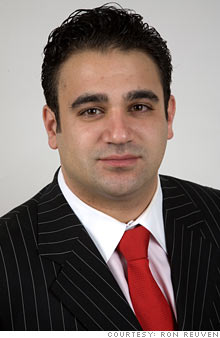Financial planners fight Madoff taint
In the wake of an historic swindle, investment advisers face heightened suspicion and red tape.
 |
| Customers are more skeptical than ever before, says financial planner Ron Reuven. |
 |
| After the Madoff scandal broke, Paul Tran and his staff called clients to explain the safeguards in place to protect their money. |
NEW YORK (CNNMoney.com) -- Bernard Madoff's investors aren't the only ones suffering through the aftershocks of his epic fraud. A cloud of suspicion hangs over the financial planning industry, forcing even longtime veterans adjust their business practices and reassure skittish clients.
"In the wake of that scandal, people don't know whom to trust," says Michael Garry, who runs his own wealth management firm in Newtown, Penn.
For Roger Balser, managing partner of Balser Wealth Management in Avon, Ohio, the Madoff mess unleashed an avalanche of new paperwork demands.
Soon after the scandal broke, Balser met with representatives from a firm that had referred customers to him in the past. The accountants -- whom Balser had known for some time -- grilled him for 90 minutes about how their clients' assets were protected from him.
"I explained that the only things I can do are execute trades and take management fees from their accounts after notifying the custodian in writing," Balser says. "The CPAs were adamant that we cease this practice of having access to the client account to withdraw management fees."
Now Balser's firm bills the clients every quarter and waits for a mailed check to pay the fees. It's been a big hassle for the small company, sucking up extra administrative hours and expenses.
The Madoff fallout is worst near the fraud's epicenter. "We serve a number of higher-end North Shore clientele and have felt the ripple effects of Bernie pooping in our sandbox," says Benjamin Chafitz, a partner with The Signature Group of Companies in Garden City, N.Y. He's seen clients affected by Madoff losses move out of homes, cancel insurance policies and change their lifestyle.
"On the investment end, we are being quizzed like never before about who the custodians are and where the assets are invested," Chafitz says. "Across the board, clients are rethinking their relationship with their advisers. It is no longer adequate to be friends; you need to be able to demonstrate that you have the ideas, resources and staff to achieve your clients' goals."
Spooked by Madoff's crimes, some clients are seeking safety in brand names.
Garry met recently with a prospect referred by a longtime customer of his. After a phone conversation, they followed up with a two-hour consultation that Garry felt went very well. But the potential client chose instead to go with a financial planner from Morgan Stanley (MS, Fortune 500). Her reason: An accountant friend told her to avoid small firms in the wake of the Madoff scandal.
"Of course, I don't think that is necessarily good advice because Madoff was hardly a tiny enterprise, and he was able to commit the fraud because he was an investment adviser and broker, just like the other large brokerage firms," Garry says. "The problem for me and others in my position is that if people aren't sure who to trust, they tend to go with names that they have heard of, like the Merrill Lynches and Smith Barneys."
Customers are more skeptical than ever before, says Ron Reuven, CEO of Reuven Enterprises in New York City.
"It seems like just a year ago, these same people did not even know some of these loopholes existed, and now they question everything that comes to mind," he says.
When pitching for new business, he runs into a Catch-22: Clients don't want to do business with an investment manager who isn't the very best, and they'll shop around to find the most successful advisers. But if you present a plan for generating above-average returns, clients are dubious -- is it another Madoff-like scheme?
The blame for this new wariness doesn't lie only with Madoff, Balser says. If industry regulators did a better job at reigning in bad operators, customers wouldn't need to be so guarded.
"The SEC and the government have not done a good enough job when the warning signs were there," he says.
It's not all doom and gloom, says Paul Tran, president of Focal Point Financial & Insurance Services in Monrovia, Calif. He thinks the combination of the Madoff debacle and the economic wipeout have created new opportunities for the best money managers.
When news of Madoff's misdeeds broke, Tran leapt into action. His staff phoned clients to explain to them why Madoff's investors fell and why they weren't going to suffer the same fate. They also took the opportunity for a check-in on how customers were weathering the recession.
"That part is crucial, because people are talking about their account balances and the economy more than anything nowadays, and for people to hear that their financial adviser took measures to insulate them from fraud and do the right thing -- expect referral calls," Tran says. "Even though account balances may have gone down with the economic downturn, bad news is almost always better than uncertain news. It's all about communication."
Joseph Sarappo, owner of Retirement Planning Specialists in Philadelphia, sees that as the silver lining in this year's streak of financial frauds.
"With Madoff and other pyramid schemes in the news, there was an overall a feeling of unease among some investors, especially those at or close to retirement age," he says. "As a result, most wealth managers will tell you that they've taken to more consistent communication with their clients."
In the long run, this year's disruptive effects could pay off for independent managers, say Seth Asher Rabinowitz, senior vice president of investor relations for Silicon Associates in Beverly Hill, Calif. His take: "It makes long-established wealth managers' clients question their relationships, and consider giving new guys a chance." ![]()
-
The Cheesecake Factory created smaller portions to survive the downturn. Play
-
A breeder of award-winning marijuana seeds is following the money and heading to the U.S. More
-
Most small businesses die within five years, but Amish businesses have a survival rate north of 90%. More
-
The 10 most popular franchise brands over the past decade -- and their failure rates. More
-
These firms are the last left in America making iconic products now in their twilight. More









